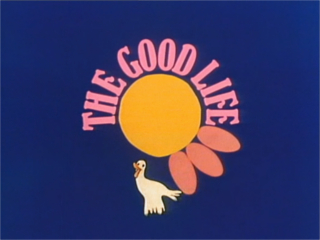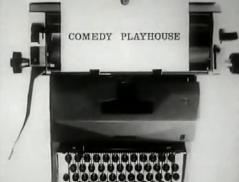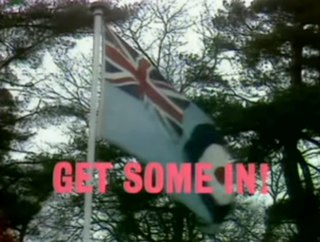Related Research Articles
A British sitcom or a Britcom is a situational comedy programme produced for British television.

Deryck Bower Guyler was an English actor, best remembered for his portrayal of officious, short-tempered middle-aged men in sitcoms such as Please Sir! and Sykes.

Richard David Briers was an English actor whose five-decade career encompassed film, radio, stage and television.

The Good Life is a British sitcom, produced by BBC television. It ran from 4 April 1975 to 10 June 1978 on BBC 1 and was written by Bob Larbey and John Esmonde. Opening with the midlife crisis of Tom Good, a 40-year-old plastics designer, it relates the joys and setbacks he and his wife Barbara experience when they attempt to escape a modern "rat race" lifestyle by "becoming totally self-sufficient" in their suburban house in Surbiton. In 2004, it came 9th in Britain's Best Sitcom. The lead roles are taken by Richard Briers and Felicity Kendal.

Robert Renwick Mortimer is an English comedian, author, television presenter, writer and actor. He is best known for his work with Vic Reeves as part of their Vic and Bob double act, and more recently the Mortimer & Whitehouse: Gone Fishing series with Paul Whitehouse. He has also appeared on panel shows such as Would I Lie to You? and Taskmaster.

Comedy Playhouse is a long-running British anthology series of one-off unrelated sitcoms that aired for 128 episodes from 1961 to 1975. Many episodes later graduated to their own series, including Steptoe and Son, Meet the Wife, Till Death Us Do Part, All Gas and Gaiters, Up Pompeii!, Not in Front of the Children, Me Mammy, That's Your Funeral, The Liver Birds, Are You Being Served? and particularly Last of the Summer Wine, which is the world's longest running sitcom, having run from January 1973 to August 2010. In all, 27 sitcoms started from a pilot in the Comedy Playhouse strand.

Paul Clark Eddington was an English actor best known for playing Jerry Leadbetter in the television sitcom The Good Life (1975–1978) and politician Jim Hacker in the sitcom Yes Minister (1980–1984) and its sequel, Yes, Prime Minister (1986–1988).

Ever Decreasing Circles is a British sitcom which ran on BBC1 between 1984 and 1989, consisting of four series and one feature-length special. It was written by John Esmonde and Bob Larbey, and it reunited them with Richard Briers, who had starred in their previous popular sitcom The Good Life.
Mulberry is a fantasy sitcom written by John Esmonde and Bob Larbey that aired on BBC 1 in the early 1990s. Mulberry ran for two series: the first series of six episodes ran from 24 February to 30 March 1992, and the second series of seven episodes ran from 8 April to 25 May 1993. A third series was planned which would have concluded the story and wrap up the plotlines established in the first two series, but was cancelled before production began. As a result, the story never reached a conclusion.
Brush Strokes is a British television sitcom broadcast on BBC1 from 1986 to 1991. Written by Esmonde and Larbey and set in South London, it depicted the (mostly) amorous adventures of a wisecracking house painter, Jacko. There were 40 episodes spread over five series.

Please Sir! is a British television sitcom created by John Esmonde and Bob Larbey and featuring actors John Alderton, Deryck Guyler, Penny Spencer, Joan Sanderson, Noel Howlett, Erik Chitty and Richard Davies. Produced by London Weekend Television for ITV, the series ran for 55 episodes between 1968 and 1972.

The Dick Emery Show is a British sketch comedy show starring Dick Emery. It was broadcast on the BBC from 1963 to 1981. It was directed and produced by Harold Snoad. The show was broadcast over 18 series with 166 episodes. The show experienced sustained popularity in the 1960s and 1970s. The BBC described the show as featuring 'a vivid cast of comic grotesques'.
Double First is a 1988 British television sitcom that aired seven episodes on BBC 1. Written by the comedy writing duo Esmonde and Larbey, the series was directed by Gareth Gwenlan. It starred Michael Williams as N. V. Standish, Ann Bell as Mary Webster, Jennifer Hilary as Louise Hobson, Holly Aird as Ellen Hobson, Clive Merrison as Derek, and Peter Tuddenham as William.

The Fenn Street Gang is a British television sitcom which ran for three seasons between 1971 and 1973. Created by John Esmonde and Bob Larbey, it was a spin-off from their popular Please Sir! series.

Please Sir! is a 1971 British comedy film directed by Mark Stuart and starring John Alderton, Deryck Guyler and Carol Hawkins. Written by John Esmonde and Bob Larbey, it is a spin-off from the ITV television series Please Sir! (1968–1972). It was released by the Rank Organisation on 10 September 1971.

Get Some In! is a British television sitcom about National Service life in the Royal Air Force, broadcast between 1975 and 1978 by Thames Television. Scripts were by John Esmonde and Bob Larbey, the team behind sitcoms such as The Good Life.
Down to Earth is a British television situation comedy, aired in 1995 on BBC One. It was devised by John Esmonde and Bob Larbey. It starred Richard Briers, who also featured in Esmonde and Larbey's earlier series called The Good Life (1975-1978) and Ever Decreasing Circles (1984-1989). One series consisting of seven episodes was produced.
Ronald Baddiley was an English actor. He was best known for his roles in the early days of the long-running British radio drama The Archers, and as Under-Secretary, Sir Gregory Pitkin, CBE in the BBC comedy The Men from the Ministry.
Room at the Bottom is a British comedy television series which originally aired as a pilot in 1966 on the Comedy Playhouse and a single series of seven episodes on BBC 1 the following year. Set in the maintenance department of a large company tower block, it was the first sitcom by the writing team of John Esmonde and Bob Larbey. All episodes from this series are currently believed to be lost due to wiping.
The Other One is a British sitcom, produced by BBC Television. It ran from 1977 to 1979, a total of 13 episodes were produced over two series and was written by Bob Larbey and John Esmonde. The series was a follow up vehicle for Richard Briers who recently had success in the sitcom The Good Life (1975–1978). The premise for the series initially focussed on two passengers Ralph Tanner (Briers) and Brian Bryant who meet at Gatwick Airport, en-route on holiday to Spain. They soon find themselves on the same flight and eventually the same hotel. Although they come from different walks of life, they soon bond and form a close friendship, as they embark on a series of misadventures.
References
- ↑ Researcha [ permanent dead link ]
- ↑ Researcha [ permanent dead link ]
- 1 2 3 4 5 Obituary: Bob Larbey, The Daily Telegraph, 4 April 2014
- 1 2 Obituary: Bob Larbey, The Guardian, 6 April 2014
- ↑ "Listings". Radio Times . No. 2311. London. 25 February 1968. p. 16. Retrieved 16 September 2016.
- ↑ "Listings". Radio Times . No. 2383. London. 10 July 1969. p. 14. Retrieved 16 September 2016.
- ↑ "'A Month of Sundays' by Bob Larbey". The Regis Players Productions. Archived from the original on 7 April 2014. Retrieved 10 September 2013.
- ↑ Ain't Misbehavin' – TV Guide